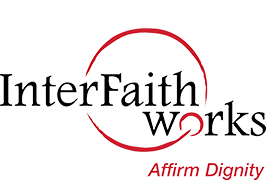Dialogue ProgramsKeith O'Brien2022-07-21T21:27:22-04:00

The El-Hindi Center for Dialogue uses its proven dialogue method – small groups of 8-15 people led by trained facilitators using a dialogue program guide – in order to address difficult topics, such as racism or intergroup or community tensions. The three types of dialogue programs in which the El-Hindi Center specializes are:
Racial Equity Dialogue • Intergroup Dialogue • Community Issues Dialogue
The El-Hindi Center also offers racial equity and multicultural organizational development and technical assistance as part of our dialogue programming. Institutions and organizations often use racial equity or intergroup dialogues as a way to foster organizational development, through the separate action plans developed by dialogue circles.
Racial Equity Dialogue

Racial Equity Dialogues helps participants to:
- Build trust
- Explore how racism has affected all of us
- Uncover stereotypes that need to be challenged
- Understand the differences between personal bigotries and structural racism
- Deepen their commitment to becoming allies
- Take action in our homes, communities, and workplaces
This dialogue brings together people of different races and ethnicities to explore how the concept of race has shaped people’s lives. As participants gain a deeper understanding of race and its impact, they work together to develop personal commitments and action plans to address racism in their everyday lives.
COLLEGE AND UNIVERSITY-BASED DIALOGUES
Racial Equity Dialogues customized to fit specific needs. Universities and college dialogues build the capacity of staff and students to talk about race and ethnicity and work together to address racism or other pressing social equity issues.
- Onondaga Community College (Student Conversation Circles)
- Syracuse University College of Engineering (Inclusive Excellence Leadership Through Dialogue)
- Le Moyne College (Dolphins in Dialogue)
- Tompkins-Cortland Community College (B.R.A.V.E. Space Dialogues)
- Syracuse University College of Law (Transformative Dialogue)
POLICE-COMMUNITY DIALOGUE
Intergroup Dialogue which builds trust, respect, and understanding between the Syracuse City Police Department and Syracuse community members. Police-Community Dialogues have been developed in collaboration with the City of Syracuse, the Syracuse Common Council, and the Syracuse Police Department to strengthen relationships and understanding between community members and law enforcement about public safety in our community and to avoid future crises. Dialogues are co-facilitated by one community member and one police officer. IFW is committed to continuing this work.
Intergroup Dialogue
Intergroup dialogues bring together people who might not otherwise have the opportunity to meet and get to know each other, or who might already know each other but have not had the opportunity to discuss how stereotypes may affect their already existing relationships.
This particular dialogue helps participants to address and break down stereotypes, build understanding among diverse groups, and teach the skills necessary to become an ally to a group different than one’s own. Intergroup dialogues often lead to life-changing experiences, altering one’s future behavior as a neighbor, employer, member of a work team, or as a student.
The Syracuse Police-Community Dialogue is one example of intergroup dialogues in Syracuse.
SCHOOL EXCHANGES
The El-Hindi Center addresses the hyper-segregation of Central New York Schools through Racial Equity Dialogues. We partner one SCSD school with one suburban or rural school for racial and social equity dialogues to build common ground and develop ways to improve their schools. Click to view an amazing video of the program.

COLUMBUS DAY DIALOGUE
A Community-Issues Dialogue that fosters a democratic process to build a common ground understanding of varying community viewpoints of Christopher Columbus and celebrations of him. The City of Syracuse contracted InterFaith Works in 2018-2019 to address the question: What should Syracuse do about Columbus Day? The Center for Dialogue wrote a guide which outlined the different viewpoints held and used this guide to foster deeper understanding of each other, and developed a report to inform the City on Common Ground held by all. Click to read the 2019 Columbus Dialogue Report. In 2020 the Center for Dialogue served again for the City of Syracuse to facilitate a Columbus Circle Action Committee, with the goal of making recommendations on the development of a Heritage and Education site at the current Columbus Circle. Click here to read the Action Committee Report.
Community Issues Dialogue

The El-Hindi Center can help Central New York communities address complex social issues and community problems that have multiple potential solutions. A community issue dialogue utilizes a Study Circle methodology which is a deliberative, democratic process – successfully implemented across the United States and globally. The facilitators use a carefully crafted neutral guide that:
- Describes the issue
- Offers a variety of solutions that represent distinctly different viewpoints
- Lays out the pros and cons of choosing one solution over the other
- Presents a set of questions that helps the participants find common ground upon which to craft a solution that the majority of the community can support
WORKPLACE DIALOGUES
Customizable Racial Equity or Intergroup Dialogues for government agencies, corporations, and non-profit organizations that lead to sustainable action plans. The El-Hindi Center for Dialogue team offers technical assistance and consulting as part of these dialogues.
FIND OUT MORE

To inquire about how our dialogue programs can serve your institutional or community needs, please email Bishop Colette Matthews-Carter or call her at 315-449-3552, ext. 111.
Testimonial Quotes
“I used to think that race was linked to biology, but now I know that race was created by people.”
“Before the dialogue I assumed that racial stereotyping was a personal construct. During the dialogue, we explored this history of government programs that systematically set back minorities by limiting their net worth. It opened my eyes that stereotypes are just another part of institutional racism in American culture.”
“I learned about what it means to be an ally, and the facts and education to back up my beliefs and share with others.”





